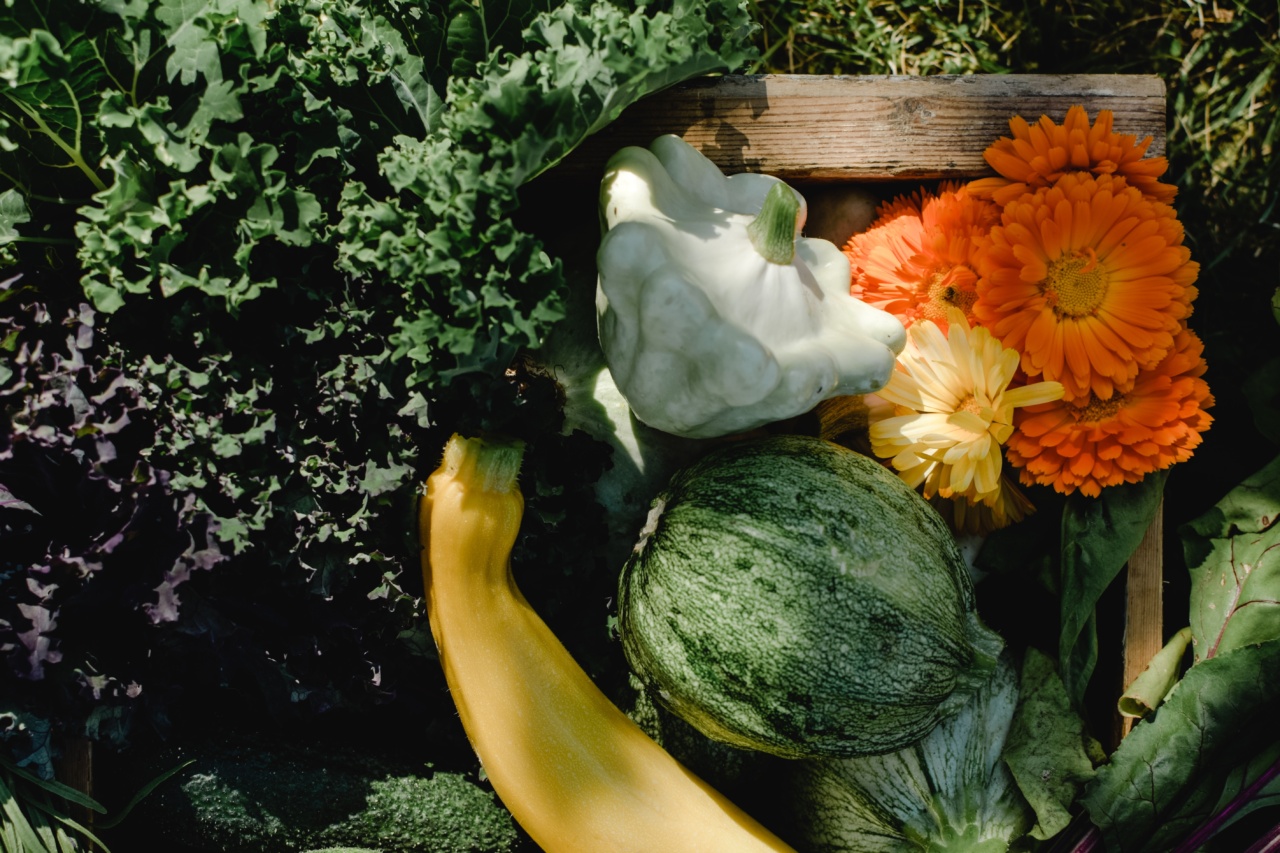Zucchini, also known as courgette in some countries, is a popular summer squash that belongs to the Cucurbitaceae family. This cylindrical green vegetable is not just a staple in the garden but also a versatile ingredient in various culinary creations.
Packed with essential nutrients, zucchini offers a wide range of health benefits, making it a must-have in your summer meals.
Origins and Varieties of Zucchini
Zucchini is believed to have originated in the Americas but gained popularity in Italy where it was first cultivated. Today, it is grown in many parts of the world, with different countries having their own unique varieties of this summer squash.
Some popular types of zucchini include:.
1. Green Zucchini
Green zucchini, with its dark green skin and white flesh, is the most common and widely available variety. It has a mild flavor and tender texture, making it ideal for various culinary applications.
2. Yellow Zucchini
Yellow zucchini, also known as golden zucchini, is characterized by its vibrant yellow skin and pale yellow flesh. It is slightly sweeter than green zucchini and adds a pop of color to dishes.
3. Round Zucchini
Round zucchini, as the name suggests, is a circular variety of zucchini. It is dense and firm, with a flavor similar to that of traditional zucchini. This type is often stuffed and baked for a delightful meal.
4. Costata Romanesco
Costata Romanesco zucchini is a heirloom variety originating from Italy. It has distinct ribbed skin and a nutty flavor. The ridges of this zucchini make it perfect for slicing and grilling, as they provide a unique texture to your dishes.
5. Lebanese Zucchini
Lebanese zucchini, also known as “Kousa” or “Kusa,” is a Middle Eastern variety popular for its small size and tender skin. Its delicate flavor and texture make it well-suited for sautéing or stuffing.
6. Eight Ball Zucchini
Eight Ball zucchini is a small, round variety that resembles a billiards ball, hence its name. Its compact size makes it ideal for stuffing or adding to kabobs, providing an interesting twist to your summer recipes.
Culinary Uses of Zucchini
Zucchini’s mild flavor and versatile nature make it a popular addition to various dishes. Here are some delicious ways to incorporate zucchini into your culinary creations:.
1. Grilled Zucchini
Slice zucchini lengthwise, brush it with olive oil, sprinkle some salt and pepper, and grill it until tender. Grilled zucchini makes a delectable side dish or can be used as a topping for burgers and sandwiches.
2. Zucchini Noodles
Use a spiralizer or julienne peeler to transform zucchini into long noodle-like strands. These zucchini noodles, also known as “zoodles,” can be substituted for pasta in a variety of dishes to create a low-carb and gluten-free alternative.
3. Zucchini Bread
Add grated zucchini to your favorite bread or muffin recipe for a moist and flavorful twist. Zucchini bread is a great way to use up excess zucchini and can be enjoyed as a nutritious breakfast or snack.
4. Ratatouille
Zucchini is a key ingredient in the classic French dish, ratatouille. Combine zucchini with other summer vegetables like eggplant, bell peppers, and tomatoes for a delightful vegetable medley.
5. Zucchini Fritters
Grate zucchini, mix it with flour, eggs, herbs, and spices, and pan-fry the mixture to make delicious fritters. These crispy and savory treats are perfect for appetizers or a light lunch.
6. Stuffed Zucchini
Hollow out zucchini and fill them with a flavorful mixture of meat, grains, herbs, and spices. Bake them in the oven for a wholesome and satisfying meal.
Health Benefits of Zucchini
In addition to its versatility in the kitchen, zucchini is packed with essential nutrients that promote overall well-being. Here are some of the health benefits of including zucchini in your diet:.
1. Rich in Vitamins and Minerals
Zucchini is a good source of vitamins A, C, and K, as well as minerals like potassium and manganese. These nutrients play a vital role in supporting immune function, maintaining healthy vision, and regulating blood pressure.
2. Low in Calories and High in Fiber
Zucchini is low in calories and high in dietary fiber, making it an excellent choice for weight management. The fiber content aids digestion, promotes feelings of fullness, and helps regulate blood sugar levels.
3. Hydrating Properties
With a water content of approximately 95%, zucchini helps keep the body hydrated, especially during hot summer months. Staying hydrated is essential for maintaining proper bodily functions and promoting healthy skin.
4. Antioxidant Powerhouse
Zucchini is rich in antioxidants, including vitamin C and beta-carotene. These compounds help combat oxidative stress and protect cells from damage caused by harmful free radicals.
5. Supports Digestive Health
The high fiber content in zucchini promotes a healthy digestive system by preventing constipation and maintaining regular bowel movements. It also supports the growth of beneficial gut bacteria.
6. Weight Management
Due to its low calorie and high fiber content, zucchini is an ideal food for weight loss or weight maintenance. Including zucchini in your meals can help you feel fuller for longer, reducing the likelihood of overeating.
7. Eye Health
Zucchini is rich in carotenoids like lutein and zeaxanthin, which are essential for maintaining healthy vision. These compounds protect the eyes from age-related macular degeneration and promote overall eye health.
8. Heart Health
The combination of fiber, potassium, and antioxidants in zucchini contributes to heart health. These nutrients help regulate blood pressure, reduce cholesterol levels, and protect against cardiovascular diseases.
9. Hydration and Healthy Skin
As mentioned earlier, zucchini’s high water content aids in hydration, which is crucial for healthy skin. It helps maintain moisture, elasticity, and a youthful appearance.
10. Anti-Inflammatory Properties
Zucchini possesses anti-inflammatory properties, thanks to its phytonutrients and antioxidants. Regular consumption of zucchini may help reduce inflammation and the risk of chronic diseases associated with inflammation.
Growing Zucchini in Your Garden
If you want to enjoy the freshest zucchini possible, growing it in your garden is a fantastic option. Here are some tips to help you cultivate this summer garden staple:.
1. Selecting a Suitable Location
Choose a sunny spot in your garden that receives at least six to eight hours of direct sunlight daily. Ensure the soil is well-draining and amended with organic matter to promote healthy plant growth.
2. Planting Zucchini Seeds
Start zucchini seeds indoors a few weeks before the last frost date in your area. Plant the seeds about half an inch deep in peat pots or biodegradable seedling trays. Transplant the seedlings outdoors once all frost danger has passed.
3. Proper Spacing
Space zucchini plants about three to four feet apart to allow adequate airflow and prevent the spread of diseases. The plants can spread quite extensively, so providing enough space ensures optimum growth.
4. Watering and Fertilizing
Keep the soil consistently moist to promote proper zucchini growth. Water the plants deeply once or twice a week, especially during hot and dry periods.
Additionally, apply a balanced organic fertilizer according to the package instructions to ensure optimal nutrient uptake.
5. Pest and Disease Management
Zucchini plants may be susceptible to pests like aphids, squash bugs, and powdery mildew. Regularly inspect your plants and take appropriate measures to control pests and prevent diseases.
Organic pest control methods, such as companion planting and hand-picking, are often effective.
6. Harvesting Zucchini
Harvest zucchini when they are young and tender, usually between six to eight inches in length. Use a sharp knife or shears to cut the zucchini from the plant, taking care not to damage the vines. Regular harvesting encourages more fruit production.
Add Zucchini to Your Summer Menu
Incorporating zucchini into your summer menu is a delicious and nutritious way to enjoy this versatile vegetable. From light salads to hearty casseroles, zucchini can elevate any dish with its unique flavor and health benefits.
Don’t miss out on the opportunity to explore the numerous culinary possibilities that zucchini has to offer.































